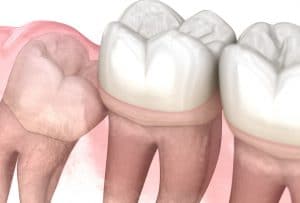 Though tooth extraction isn’t a typically recommended dental treatment option, there are some conditions in which extracting a tooth is your smile’s best option. The need for tooth extraction can stem from several different specific reasons, but in each case, it’s due to the fact that the tooth can’t be saved or restored. For example, one of the more frequently extracted types of teeth include wisdom teeth, which can become impacted and unable to erupt, making them a significant threat to the rest of your oral health.
Though tooth extraction isn’t a typically recommended dental treatment option, there are some conditions in which extracting a tooth is your smile’s best option. The need for tooth extraction can stem from several different specific reasons, but in each case, it’s due to the fact that the tooth can’t be saved or restored. For example, one of the more frequently extracted types of teeth include wisdom teeth, which can become impacted and unable to erupt, making them a significant threat to the rest of your oral health.
The problems wisdom teeth can cause
Wisdom teeth is the unofficial name for the third set of permanent molars to develop on your dental ridges. These molars typically develop between the ages of 17-25, which is where they get the name wisdom teeth from (this is historically known as the age of wisdom). Over the centuries, however, our diets grown softer and less-demanding on our teeth, and our dental ridges have evolved as a result. For many people, there isn’t enough room left on their dental ridges to accommodate the additional set of molars.
When extracting them is a good idea
When a wisdom tooth becomes impacted, it means that it’s stuck withing the bone structure of the dental ridge, impeded by the presence of the previous molar. This makes the third molar unable to erupt from the ridge, and can force it to grow at an angle instead of vertically. However, this doesn’t stop the molar from attempting to erupt; it will continue pushing against the tooth and bone structure that it’s impacted behind. This can lead to a wide range of problems involving the health and integrity of your jawbone structure as well as the strength and long-term health of the rest of your teeth.
The good thing about extracting wisdom teeth
When other types of teeth have to be extracted, their removal can lead to negative impacts on the rest of your smile. However, the reason wisdom teeth have to be extracted is because your dental ridge is already full of teeth, and they don’t have room to grow or erupt. After extracting one or more troublesome wisdom teeth, the molars don’t have to be replaced in order to restore your good oral health and bite function.
Learn if your wisdom teeth need extraction
Wisdom teeth aren’t always problematic, but if yours become impacted, then extracting them as soon as possible could be essential to preserving your long-term oral health. To learn more, schedule an appointment by calling Gentle Smiles in Dallas, TX, today at 972-329-7645 (972-329-SMILE).






Recent Comments